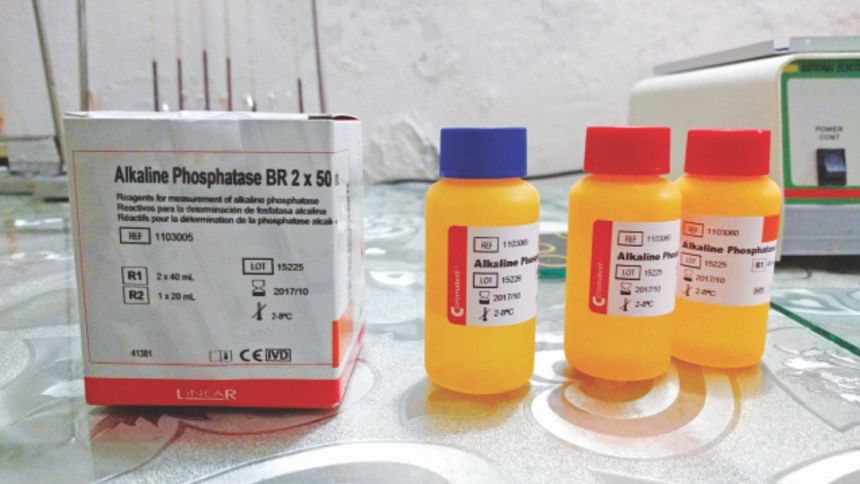Glimpses into the shady hospitals

A foul-smelling narrow corridor, housing a cluttered drug store. A drug store selling unregistered and expired medicines. A pathologist with no education or training.
These are just the first discoveries a joint inspection team of Rapid Action Battalion, Directorate General of Drug Administration (DGDA) and Directorate General of Health Services (DGHS) made during a drive against private hospitals and diagnostic centres in Mohammadpur on Wednesday.
The drive began just after midday.
The employees of Shefa General Hospital and Medical Centre, a well-known medical centre in Mohammadpur, were going about their daily tasks.
Unbeknownst to them, close by the team was about to begin an inspection of the centre.
Without warning, the inspection team entered the building and locked it from inside, forbidding anyone from leaving. The inspection revealed a very dismal and worrying picture of the health sector.
The first thing that struck the team was a sickening stench that hung thick in the air, posing a serious health hazard. The stink led Sarwoer Alam, the magistrate leading the team, to a lavatory. Disgusted, Rab members found the centre's lab just beside it.
The so-called pathologist, Uday Roy, from Barguna, couldn't muster an answer when the magistrate peppered him with a rapid round of questions.
Finally, he admitted that he was just a technician without the necessary education or skills to carry out lab investigations.
The lab reports were apparently signed by one doctor but the signatures surprisingly varied.
In the hospital's drug store, officials of the DGDA found stacks of unregistered drugs, including imported tetanus vaccines, and date-expired intravenous pain medications. It also didn't have any pharmacist to oversee the sales of drugs.
While scrutinising records of lab tests and other documents like licences, Sarwoer said inaccurate lab tests were one of the main reasons for the poor state of the country's healthcare. Doctors and treatment methods were not wholly responsible.
Around the corner of the lab, Dewan Md Mehedi Hasan, medical officer of the DGHS, squeezed in to check the freezer and took out some date-expired reagents that were being used in pathological tests.
He then began looking for bins to dispose of them. “Where are they? Each hospital should have four bins of as many colours,” he said.
A clear instruction from the authority to hospitals and clinics regarding waste disposal says that they should have four bins -- green, black, yellow and red -- to keep regular, infected, sharp, pathological and plastic waste separately.
As the inspection continued to lay bare the hospital's complete failure to maintain any standard, anxiety began to grow among the hospital staff. They now stopped offering explanations and defending their actions.
When being questioned, one of the hospital owners, who introduced himself only as Alam, received a phone with the caller asking him to leave.
He kept the phone in his pocket, locked his desk drawers and sneaked out of the office room, only to be stopped at the gate by the armed personnel of Rab.
The team then climbed up to the next two floors to see the condition of the operating theatre, wards and cabins.
Dust-covered surgical lightheads, blood-stained clothes on the operating table, instruments wrapped in wet cloths being readied for use in another operation were blatant examples of negligence in healthcare safety.
At the end of the inspection, the magistrate fined the owners Tk 7 lakh and asked them to reform their system and comply with the rules set to continue the operation of the hospital.
However, he instructed the pathological lab to be shut down as the ambience inside was not conducive to conducting tests.
BLOOD TRANSFUSION RISKING LIVES
More concerning details came about during the raid on Makkha Madina General Hospital and Diagnostic Centre.
Looking for expired medicines and reagents in the freezer inside the pathological lab at the centre, Mehedi, the DG Health official, found a blood bag that was not supposed to be in the same freezer. Moreover, the bag didn't bear any collection and expiry dates. Also, it was not a clinical freezer and so it didn't have any mechanism for reading temperatures.
How did the hospital maintain the temperature at which the drugs and reagents should be stored? They could at least keep a thermometer inside the freezer to check the temperature from time to time, Mehedi said.
Searching for the hospital owner, Rab found an escape route at the back of the hospital with the door wide open. He had fled.
Going through hospital records, the team found that the storing and cross matching of blood were done without permission from the authorities, a criminal act that can lead to transmission of diseases such as HIV, hepatitis and malaria.
“The safe blood transfusion rules 2008 are probably the toughest and most recent of all in the health sector. Still, these clinics dare to not follow it,” Mehedi said.
FALSE PROMISES TO PATIENTS
Seeing law enforcers, the father of a patient ran to them pleading for help.
Ali Sharif, 36, said his teenage son Hasan, who broke his leg in a road accident, was refused further treatment as he had failed to give any more money. He had already paid around Tk 40,000 in three days.
Speaking to Hasan's mother, Shirin Akhter, 30, another unethical facet of the hospital emerged.
Shirin claimed that she took her son to the National Institute of Traumatology and Orthopaedic Rehabilitation (NITOR), a public hospital popularly known as Pangu Hospital. There, she met two men who turned out to be brokers.
The men brought them to Makkha Madina hospital instead, promising to help the boy get admitted hassle free, Shirin said.
Other patients surrounded the team to make similar complaints.
WHO CONDUCTED THE OPERATIONS
Things got worse for the hospital when the inspection team could not find any trace of the operation notes.
In wards and beds in the hospital, patients were lying with their hands and legs bandaged and so it was quite difficult for the hospital staff to deny having operated on them.
“How can I be sure that the operation was not conducted by a quack?” Mehedi asked the nurse in charge. Further grilling revealed that she was a paramedic and not a nurse.
After the inspection ended, Sarwoer announced that the premises would be sealed and so the place should be evacuated soon. He then referred the patients still requiring treatment to NITOR.
The next hospital on the radar was Al-Markajul Islami Hospital that had an X-ray machine but didn't have mandatory approval from Bangladesh Atomic Energy Commission.
When sorting out the piles of papers, out came a notice issued three days ago by the health directorate clearly saying all activities of the organisation should remain suspended for not complying with government rules.
With the verdict already passed, there was nothing else to see here. The magistrate ordered all the patients to be immediately released. The hospital that occupies six floors of the seven-storey building will remain shut until licences are renewed.
Jenith Diagnostic Centre was next.
After sundown, finding similar violations in the hospital, Sarwoer faced the owner of Jenith centre, shockingly a retired doctor himself.
“It is for the utter callousness of those involved in the health sector that patients feel forced to go abroad for treatment,” he said.
Good infrastructure, standard machinery, quality medicines and reagents mean nothing if skilled people don't use them properly and efficiently.
“No compensation, no punishment is enough if we take into account the impact of wrong diagnosis on a patient,” Sarwoer said.
The team also inspected Sandhi Diagnostic Centre, Bangladesh Trauma Specilised Hospital and New Medicom Medical Services. All were non-compliant, similarly putting public health at risk.
As night fell, the team sealed New Medicom, whose owners refused to show up and pay the fines. To everyone involved, it was clear that this was just the tip of the iceberg and more such drives would be needed.

 For all latest news, follow The Daily Star's Google News channel.
For all latest news, follow The Daily Star's Google News channel. 





Comments